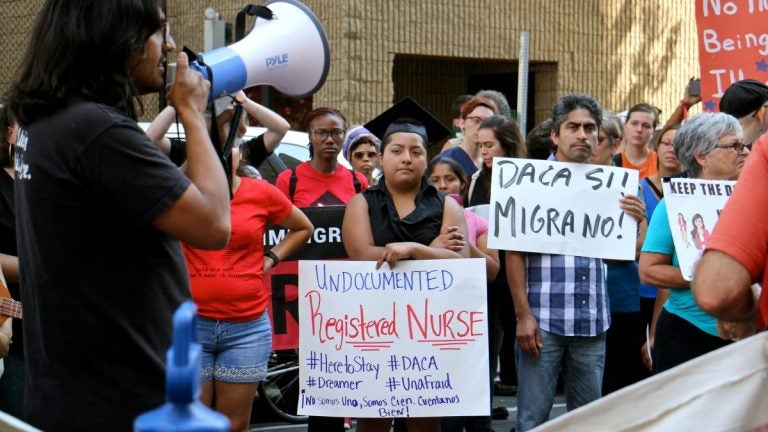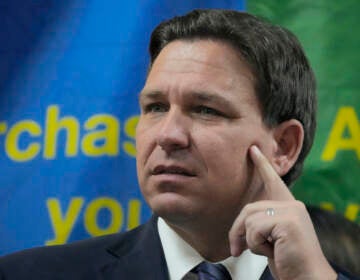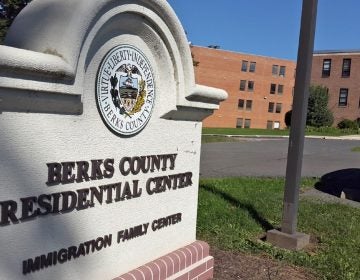Why health care providers are pressing Trump to keep DACA
As the Trump administration moves to end DACA, health care providers rally behind the roughly 20,000 recipients they say fill important needs in the medical industry.
Listen 0:00
Anel Medina, a registered nurse who earned her degree from Delaware County Community College, joins a rally in Philadelphia in support of DACA. (Emma Lee/WHYY)
Anel Medina had her heart set on becoming a nurse since since she was a teenager growing up in southern Chester County, Pennsylvania. But there was a problem: her mom brought her to the country illegally from Mexico when she was 5.
Without a Social Security number, Medina could not work with patients. Still, she pursued her goal as though it were possible.
“Since I graduated in 2009, I went to school, took electives, got all of my pre-reqs out of the way, so I was basically just waiting for something to happen,” said Medina, now 26.
Medina worked at two restaurants and went to school part time when that “something” did happen: President Obama announced a new program called Deferred Action for Childhood Arrivals, or DACA, which began in 2012.
Medina, who was 21 at the time, remembers the day she got the green light to pursue her dream career.
“I was with a co-worker who was [also] undocumented. I just remember sitting in the middle of the restaurant. We had the television on” as Obama announced the program, she said. “We were speechless. I cried. I was just very happy to be able to do what I wanted to do.”
Fast forward to September when President Donald Trump announced he would pull the plug on DACA with the hope of forcing Congress to replace it with a permanent policy.
Now, health care providers are rallying behind their employees with DACA whom they say fill important needs in their industry.
“It is throwing some of the finest talent out of our country for something they had no ability to control,” said Sister Carol Keehan, president and CEO of the Catholic Health Association of the United States. Keehan, along with the CEOs of 15 hospital systems, wrote a letter of concern to Trump after he decided to end DACA.
“As employers of millions of dedicated health care professionals, we have a very strong interest in ensuring a continued supply of great potential employees,” wrote the CEOs. “We have seen firsthand how the DACA ‘Dreamers’ have benefited our organizations at many levels of our teams.”
Doctors join in push to keep DACA
The American Medical Association, which represents doctors and medical students, took up the drumbeat as well, saying a permanent DACA program would help offset a growing shortage of physicians. That doctor deficit stands at 8,200 primary care physicians, according to the Health Resources and Services Administration, and is estimated grow into the 10,000s in coming decades.
About 20,000 DACA recipients work in health care or health care support, according to the Migration Policy Institute. That’s a small slice of the nearly 800,000 people who have ever applied to the program, which temporarily shields child arrivals from deportation and grants them legal work authorization. It’s an even smaller portion of health care workers as a whole.
But medical industry leaders point not just to how many DACA recipients there are in health care, but also where they work, as one important reason to continue the program.
“Removing those with DACA status will particularly create care shortages for rural and other under-served areas,” wrote James L. Madara, executive vice president of the AMA. “DACA physicians are more likely to work in high-need areas where communities face challenges in recruiting other physicians. DACA students are also more likely to be bilingual, to come from diverse cultural backgrounds, and to understand challenges in certain ethnic communities.”
Health workers in program fill a void
That’s been the experience of La Comunidad Hispana, a federally qualified health center in Kennett Square, Pennsylvania.
“We’re a little too far from the metropolitan areas like Philadelphia or Baltimore, so we’re recruiting from a very local, Chester County, recruitment pool,” said LCH executive director Alisa Jones. Jones said between five and 10 people on staff at the health center have DACA, and that background helps them relate to other patients at the center, which serves low-income people and those without insurance, in both English and Spanish.
“They bring a unique perspective,” Jones said. “They bring a cultural competency for serving vulnerable populations that we otherwise would not have.”
That desire to serve is what drove Anel Medina into nursing. She saw her mother and other mushroom pickers in southern Chester County resist going to the doctor for fear of being deported.
“Seeing her and her peers get sick with a cold or back pain or even the yearly mammograms that women need to have, and always feeling like they weren’t being reached,” she said. Medina, now a registered nurse at Chester County Hospital, works the night shift in the oncology ward. In between overnights, she volunteers for her former employer, La Comunidad Hispana.
Medina doesn’t have a plan B if DACA goes away — her permit would expire in 2019. But, she is resolved to stay and serve her community for as long as she can.
WHYY is your source for fact-based, in-depth journalism and information. As a nonprofit organization, we rely on financial support from readers like you. Please give today.




